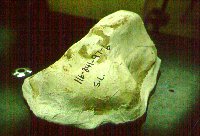Dinosaur Bone Preparation III.
A Hadrosaur Death.
The Hanson Ranch Research Station Project
When the cast was opened, the mystery began to unfold as the encasing rock was slowly removed from the bone
Photos © 1999 J. Long
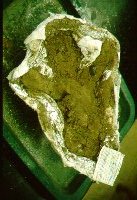
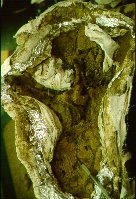
The bony material was about 15 inches in overall length, and as it emerged from the matrix, it was easily recognizable as a vertebra.
Photos © 1999 J. Long
`
What was astonishing about the vertebra was the extent to which the centrum had been crushed. Here on the distal surface, the bone has been completely separated from the articular surface.
Photos © 1999 J. Long
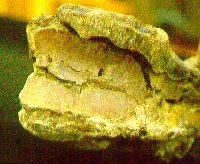
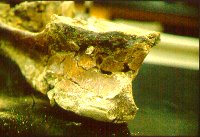
An examination of the proximal surface revealed the source of the force responsible for crushing the huge centrum: four evenly spaced tooth marks in a row up the center off the vertebra. Considering the jaw reach necessary for the predator's teeth to penetrate the flesh and the bone itself on this 18' high vertebra eliminates most predators. Only T. rex wwould have been capable of inflicting this death wound to the hadrosaur
Photos © 1999 J. Long
Back 
 Return
Return
| ||||
| |||
| ||||
| |||
Back 
 Return
Return
